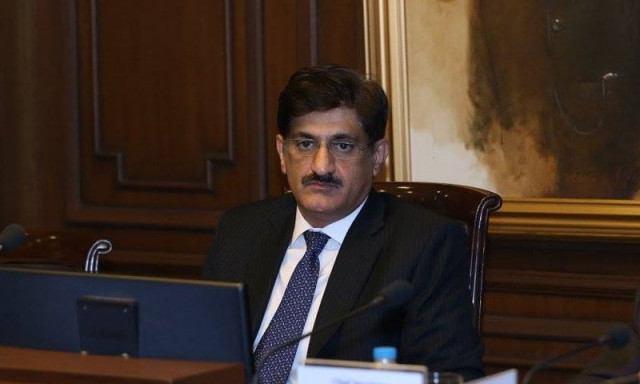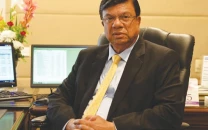Governance at arm’s length: Sindh govt shifts more of its burden on private sector
In 27th meeting, Public-Private Partnership Board approves several projects to dole out to contractors

Sindh CM Murad Ali Shah. PHOTO: PPP/ TWITTER
A case in point is the recent inquiry initiated by the Anti-Corruption Establishment into the 52 schools being run by non-government organisations (NGOs) on paper. The said NGOs had received millions of rupees in funds but had not even established the schools in the designated areas.
But the Sindh government seems to care little about these finer details so long as its actions look good on paper.
The 27th meeting of the Public-Private Partnership (PPP) board approved on Thursday various projects in the education, health, agriculture and infrastructure sectors to be launched under the PPP mode.
The meeting, chaired by Sindh Chief Minister Murad Ali Shah, was attended by Chief Secretary Mumtaz Shah, provincial ministers Dr Azra Pechuho, Syed Sardar Shah, Mohammad Ismail Rahu, Saeed Ghani and Owais Shah, Planning and Development (P&D) Chairperson Mohammad Waseem, Principal Secretary to CM Sajid Jamal Abro and other secretaries.
Education
The school education department presented a case to enter into a management contract with an education management organization (EMO) from the private sector to manage and improve the functioning of Teacher Training Institute, Hussainabad Karachi, by introducing innovations, modernising the education system, addressing management gaps and maintaining and upgrading the institute's building and facilities.
The chief minister said that only the punctuality of teachers was not enough. They must also be skilled enough to conduct the class. "We have to strengthen and improve our teachers' training institutes in partnership with the private sector," he said.
He said that the contractor, which would be selected through a competitive process, will have the authority to appoint professional trainers for teachers' training. He added that the government would pay the salaries of teachers and others staff, but the private partner would have to run the training institute on a professional basis.
The PPP board decided to complete the contracting process on merit basis and hand over the training institute to a private partner.
Education Secretary Qazi Shahid Parvez presented another project of Sindh Basic Education Programme, under which the Sindh government and USAID constructed 25 schools in the flood-affected areas of the province. The education department has decided to operate these schools through PPP by well-reputed EMOs. The organisations have been selected through a competitive process, therefore the policy board approved to issue the Letters of Award (LOA).
The PPP board also discussed handing over 37 schools of Islamkot to Thar Foundation. The CM said that the provincial government was a major partner of Thar Foundation. Therefore, handing over 37 schools of the education department to Thar Foundation would not be a big issue. The board agreed to hire a consultant for the project.
Regional Blood Centres
Health officials informed the meeting that four state-of-the-art Regional Blood Centers (RBCs) had been established with assistance from the German Development Bank in Sukkur, Jamshoro, Shaheed Benazirabad and Karachi.
These RBC have been contracted out to private partners "through a proper procedure," the meeting was informed. The RBCs in Jamshoro and Sukkur have been handed over to Indus Hospital and Sukkur Blood and Drug Donating Society, respectively, while the Karachi RBC was being given to Dr Ziauddin Hospital and Shaheed Benazirabad RBC to Fatimid Foundation. The PPP policy board approved the handing over of the RBC to private partners.
The District Headquarter Hospital (DHQ) Badin is being run by Indus Hospital on PPP mode. The PPP policy board approved to give a one time grant of Rs1.08 billion to the hospital so that its requirements of equipment and building works could be fulfilled.
Ghotki-Kandhkot bridge
The Chief Minister said that Sindh was bisected by River Indus with a large population living on either side of the river. He added that Ghotki, which was an emerging industrial town, was on one side and Kandhkot, located on the proposed China- Pak Economic Corridor, on the other.
The meeting was informed that the distance between Kandhkot and Ghotki via Guddu Barrage was 151 kilometres. A bridge connecting Ghotki and Kandhkot would reduce this distance from 151 km to 30 km. The process to construct it on PPP mode has almost been completed, therefore the board accorded approval to finalise the process.
Mango processing unit
The Agriculture Department proposed to establish a Mango Processing Unit on Hyderabad-Mirpurkhas road. The unit would have the facility of mechanised washing and grading, value-added segment, blast chillers, packaging and labeling, microbiology and a quality control lab. It would cost over Rs1.5 billion. The policy board directed the department to re-tender the project and select the successful bidder.
Malir Expressway
Some technical aspects of Malir Expressway were discussed in the meeting, which approved them. Seven bidders have already filed their technical proposals.
The meeting also approved to invite fresh bids for the BRT Blue Line Infrastructure project.
Published in The Express Tribune, December 14th, 2018.



















COMMENTS
Comments are moderated and generally will be posted if they are on-topic and not abusive.
For more information, please see our Comments FAQ